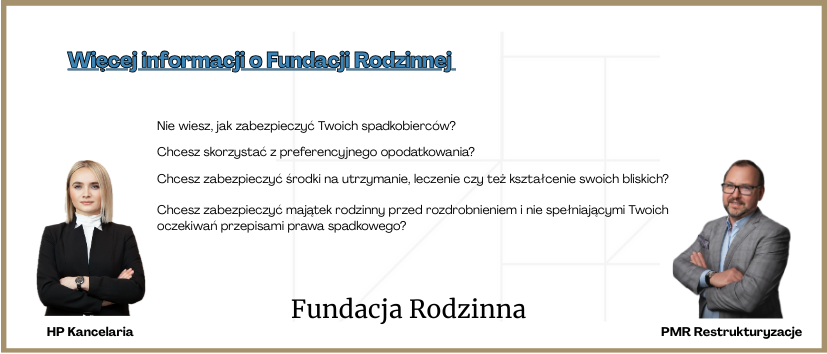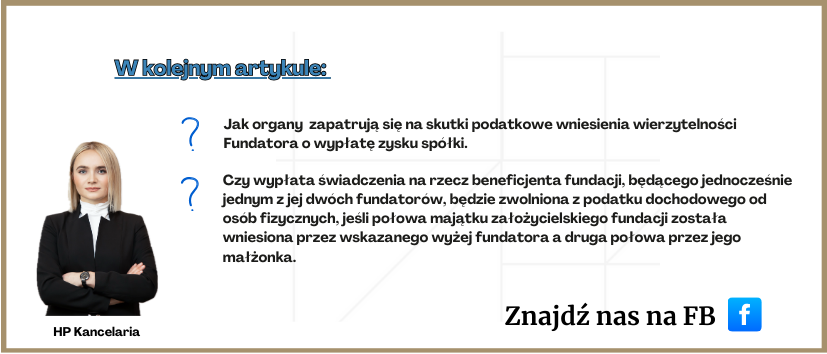The family foundation is a relatively new creation, and therefore representatives of legal science and practice have not yet faced all the problems that the functioning of this institution in the changing conditions of legal transactions entails. However, courts and tax administration bodies are gradually beginning to work out solutions to some problems.
This article is the first in a series of texts from which you will learn about the most important court rulings, tax interpretations and letters issued by tax administration authorities regarding family foundations.
Contents
A few words about the article - Listen
Contribution of a business to a family foundation and VAT
In one of the cases pending before the Director of the National Tax Information, the taxpayers’ question concerned the decision on whether the contribution of all assets related to a sole proprietorship to a family foundation – in the light of Art. 6 item 1 of the Act – would be subject to goods and services tax.

The Director of KIS in an individual interpretation of April 26, 2024, 0112-KDIL3.4012.174.2024.1.AK, considered that the contribution of all assets related to the sole proprietorship run by the founder to a family foundation by way of a donation - in the light of art. 6 item 1 of the Act, will not be subject to taxation with goods and services tax, however, subject to certain conditions. It should be noted that the examination will each time be subject to whether the enterprise has been sold and whether the acquirer intends to run the transferred enterprise, and not to liquidate it. In order to recognize that the subject of the performed activity is an enterprise, this subject must absolutely include those elements that will enable the continuation of the business activity. The key element is therefore the continuity of the business activity and appropriate documentation confirming the intention of the foundation to continue its activity. The authority emphasized that it is possible to contractually exclude certain elements from the transaction of the sale of the enterprise, provided that they are not of material significance for its functioning.
Contribution of a business to a family foundation as a donation and CIT tax
Let us also consider the issue of CIT in the same situation, i.e. contributing a business to a family foundation as a donation.
Let's assume that the real estate rental business will be carried out based on the assets currently included in the enterprise run by the Founder as a sole proprietorship. The Founder plans to contribute his enterprise to the Family Foundation as a donation after the Family Foundation is registered by the registry court.

On August 29, 2024, an application for an individual interpretation was received, which concerned corporate income tax in the scope of determining just such a situation - whether the Family Foundation's receipt of a business donation will be exempt from corporate income tax on the basis of art. 6 sec. 1 item 25 of the Corporate Income Tax Act on the part of the Family Foundation, and therefore, the Family Foundation will not be obliged to recognize tax income for corporate income tax purposes in connection with receiving this donation.
In a letter dated November 22, 2024, the Director of the National Tax Information 0111-KDIB1-2.4010.488.2024.3.DK, indicated that, Family foundations are, in principle, exempt from corporate income tax under art. 6 sec. 1 item 25 of the CIT Act. Exceptions to this rule are provided for in the provisions of art. 6 sec. 6-9 of the CIT Act, but they do not cover events involving the receipt of property by a family foundation, including in the form of a donation.
Therefore, as a result of a family foundation receiving a donation of a set of components in the form of the Founder's enterprise, the foundation will not generate any taxable income.
In connection with the above, the Authority assumed that the receipt by the Family Foundation of a donation of a set of components described in the application will be exempt from corporate income tax on the part of the Family Foundation under art. 6 sec. 1 item 25 of the CIT Act and the Family Foundation will not be obliged to recognize taxable income for corporate income tax purposes in connection with receiving this donation.
Summary: What does the founder gain?
To sum up, the tax exemptions described above again speak in favor of a family foundation, they are certainly intended to facilitate succession and enable the smooth transfer of assets to the family foundation without tax burdens, which is certainly conducive to long-term management of the family business and assets.
Announcement of the next article

In the next article, you will learn how the authorities view the tax consequences of the Founder's claim for payment of the company's profit. We will also answer the question of whether the payment of a benefit to a foundation's beneficiary, who is also one of its two founders, will be exempt from personal income tax if half of the foundation's founding assets was contributed by the above-mentioned founder and the other half by his spouse.

























